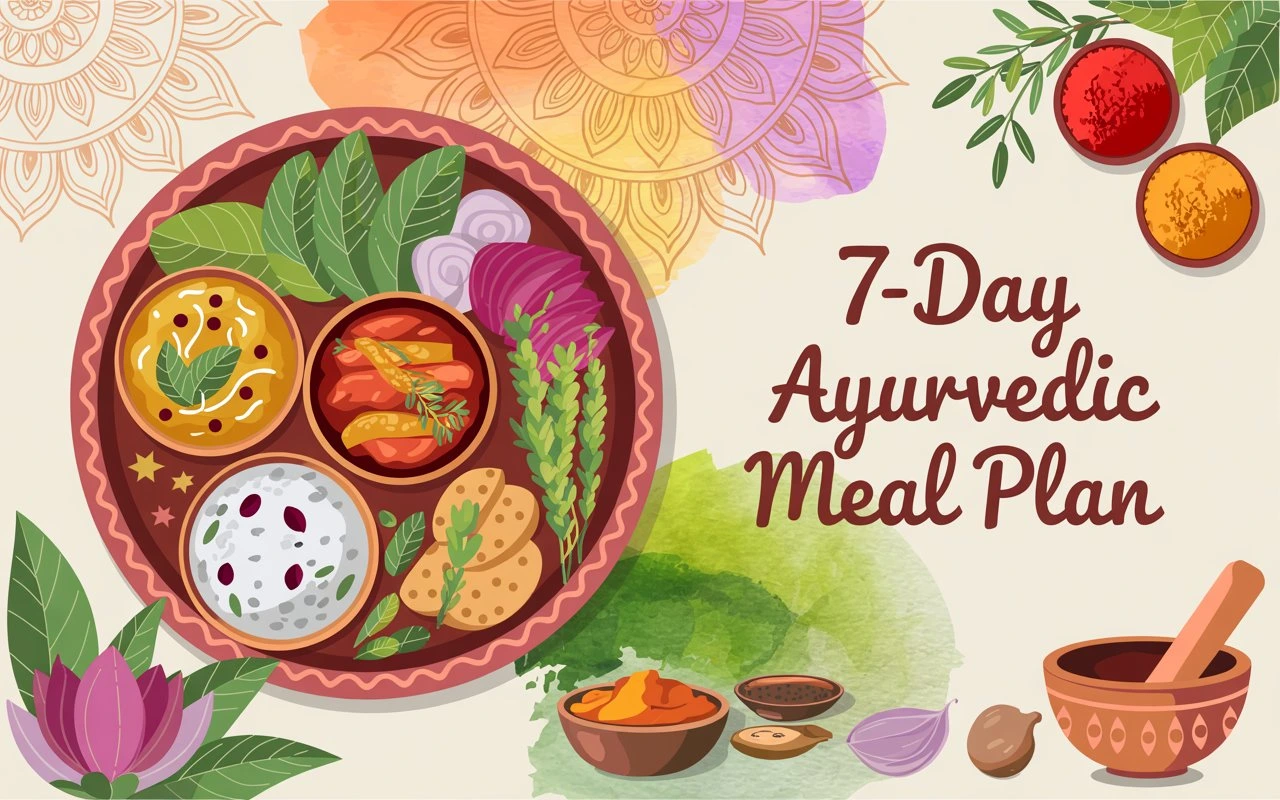Have you ever wondered why some foods make you feel energized while others leave you feeling sluggish? Or why your friend thrives on raw salads while they make your digestion go haywire? The ancient wisdom of Ayurveda might just have the answers you’re looking for. As someone who’s experienced the transformative power of Ayurvedic eating firsthand, I’m excited to share this comprehensive 7-day meal plan that could change your relationship with food forever.
Ayurveda isn’t just another diet trend—it’s a 5,000-year-old healing system that views food as medicine. When I first discovered Ayurvedic nutrition principles, I was skeptical but desperate for solutions to my persistent digestive issues and energy fluctuations. Little did I know that understanding my unique dosha (body constitution) would revolutionize not just what I eat, but how and when I eat.
This 7-day Ayurvedic meal plan isn’t about restriction or complicated rules. Instead, it’s a gentle introduction to eating in harmony with your body’s natural intelligence. By following these guidelines, you’ll likely experience improved digestion, more stable energy, better sleep, and a clearer mind—benefits I’ve personally enjoyed since adopting these practices.
The Smoothie Diet: Transform Your Body in 21 Days

Looking for a refreshing weight loss solution? The Smoothie Diet offers a delicious 21-day program that delivers impressive results while nourishing your body.
How It Works
Replace two daily meals with nutrient-packed smoothies from 36 carefully crafted recipes. Enjoy one solid meal and two healthy snacks daily, maintaining approximately 1,500 calories. The program includes a comprehensive e-book, shopping lists, and weekly schedules to keep you on track.
Benefits You’ll Experience
- Rapid weight loss (some report up to 9 pounds in 3 days)
- Enhanced energy and immunity
- Improved skin and digestive health
- Convenient meal preparation
- Higher intake of fruits and vegetables
The optional 3-day detox phase kickstarts your journey before the full program begins. By combining whole foods like berries, spinach, and lean proteins with limited processed ingredients, this plan helps reset eating habits while providing essential nutrients.
Whether you’re seeking quick results or a healthier lifestyle, The Smoothie Diet offers a practical approach that’s both effective and sustainable.
Also Read:
Gallbladder 7 Day Meal Plan
30-Day Low Fodmap Meal Plan Pdf
7 Day Meal Plan for Football Players
500 Calories a Day Meal Plan Pdf
Prolon Transition Day Meal Plan
40 Day Turn Up Meal Plan PDF
7-Day Ayurvedic Meal Plan Overview
Here’s a quick overview of our 7-day journey:
| Day | Focus | Key Benefits |
|---|---|---|
| Day 1 | Grounding & Nourishing | Establishes digestive rhythm, provides stable energy |
| Day 2 | Boosting Digestive Fire | Enhances metabolism, improves nutrient absorption |
| Day 3 | Cleansing & Rejuvenating | Removes toxins, increases vitality |
| Day 4 | Building Strength & Vitality | Nourishes tissues, supports immunity |
| Day 5 | Enhancing Metabolism | Balances blood sugar, optimizes fat metabolism |
| Day 6 | Nurturing Balance & Harmony | Calms nervous system, promotes mental clarity |
| Day 7 | Integration & Sustainability | Consolidates benefits, establishes sustainable habits |
Understanding Ayurvedic Nutrition Principles
Before diving into meal plans, let’s understand the fundamental principles that make Ayurvedic nutrition so effective and timeless.

The Three Doshas: Your Unique Constitution
According to Ayurveda, we’re all made up of a unique combination of three energetic forces or doshas:
- Vata (air and space): If you’re predominantly Vata, you’re likely creative, quick-moving, and have a variable appetite. When imbalanced, you might experience dry skin, constipation, and anxiety.
- Pitta (fire and water): Pitta types are typically focused, ambitious, and have strong digestion. When out of balance, you might suffer from inflammation, irritability, and acid reflux.
- Kapha (earth and water): If Kapha dominates your constitution, you’re probably steady, compassionate, and have a slow metabolism. Imbalances can manifest as weight gain, congestion, and lethargy.
The Six Tastes: Nature’s Perfect Balance
Ayurveda recognizes six tastes that should ideally be included in every meal:
| Taste | Elements | Effect on Doshas | Food Examples |
|---|---|---|---|
| Sweet | Earth & Water | Decreases Vata & Pitta, Increases Kapha | Grains, dairy, sweet fruits |
| Sour | Earth & Fire | Decreases Vata, Increases Pitta & Kapha | Citrus, yogurt, fermented foods |
| Salty | Water & Fire | Decreases Vata, Increases Pitta & Kapha | Sea salt, seaweed, salted foods |
| Pungent | Fire & Air | Decreases Kapha, Increases Vata & Pitta | Chili, ginger, garlic |
| Bitter | Air & Space | Decreases Pitta & Kapha, Increases Vata | Leafy greens, turmeric, coffee |
| Astringent | Air & Earth | Decreases Pitta & Kapha, Increases Vata | Beans, pomegranate, green tea |
Complete 7-Day Ayurvedic Meal Plan
Here’s your comprehensive meal plan for the entire week:
| Day | Breakfast | Lunch | Dinner | Snacks & Teas |
|---|---|---|---|---|
| Day 1: Grounding & Nourishing | Stewed Apples with Cinnamon & Cardamom | Kitchari (Mung Bean & Rice Porridge) with Seasonal Vegetables | Vegetable Soup with Ginger & Turmeric | Morning: Ginger TeaAfternoon: CCF TeaEvening: Warm Milk with Nutmeg |
| Day 2: Boosting Digestive Fire | Warming Quinoa Porridge with Spices | Mung Bean Soup with Seasonal Vegetables | Steamed Vegetables with Cumin-Lime Dressing | Morning: Fresh Ginger WaterAfternoon: Digestive LassiEvening: Ginger-Cinnamon Tea |
| Day 3: Cleansing & Rejuvenating | Cleansing Fruit Salad with Mint | Light Vegetable Khichdi with Turmeric | Steamed Greens with Lemon & Ghee | Morning: Lemon-Cayenne WaterAfternoon: Detox Tea (Dandelion, Mint)Evening: Triphala Tea |
| Day 4: Building Strength & Vitality | Almond-Date Porridge with Cardamom | Red Lentil Soup with Vegetables | Roasted Root Vegetables with Tahini Sauce | Morning: Ashwagandha TeaAfternoon: Almond Milk with DatesEvening: Golden Milk (Turmeric Milk) |
| Day 5: Enhancing Metabolism | Spiced Amaranth Porridge | Chickpea & Vegetable Curry | Baked Vegetables with Cumin & Coriander | Morning: Metabolism-Boosting TeaAfternoon: Spiced ButtermilkEvening: Fennel Tea |
| Day 6: Nurturing Balance & Harmony | Rose-Cardamom Oatmeal | Rainbow Vegetable Bowl with Tahini Dressing | Millet Soup with Herbs | Morning: Rose WaterAfternoon: Brahmi TeaEvening: Calming Chamomile Tea |
| Day 7: Integration & Sustainability | Coconut-Chia Pudding with Berries | Balanced Thali (Mixed Plate) | Vegetable Stir-Fry with Quinoa | Morning: Your Favorite Morning TeaAfternoon: Seasonal Fruit SmoothieEvening: Personalized Herbal Tea |
Detailed Daily Plans
Day 1: Grounding and Nourishing
Morning Rituals:
- Wake up before 6:30 AM
- Tongue scraping and warm lemon water
- 10-15 minutes of gentle stretching
Breakfast: Stewed Apples with Cinnamon and Cardamom
Ingredients: 1 apple, cinnamon, cardamom, ghee, soaked almonds
Benefits: Gently awakens digestion, provides sustainable energy, balances blood sugar
Lunch: Kitchari with Seasonal Vegetables
Ingredients: Basmati rice, yellow mung dal, ghee, cumin, turmeric, coriander, seasonal vegetables
Benefits: The ultimate healing food in Ayurveda, balances all doshas, easy to digest
Dinner: Vegetable Soup with Ginger and Turmeric
Ingredients: Mixed vegetables, ginger, turmeric, ghee, vegetable broth, coconut milk
Benefits: Light yet nourishing, supports sound sleep, reduces inflammation
Day 2: Boosting Digestive Fire
Morning Practices:
- Tongue scraping and fresh ginger water
- 5 minutes of twisting yoga poses
- 10 rounds of Kapalabhati breathing
Breakfast: Warming Quinoa Porridge
Ingredients: Quinoa, almond milk, ghee, warming spices, dates, pumpkin seeds
Benefits: Complete protein, sustained energy, lighter than many grains
Lunch: Mung Bean Soup with Seasonal Vegetables
Ingredients: Whole green mung beans, ghee, digestive spices, seasonal vegetables
Benefits: Highly digestible protein, detoxifying, balances all doshas
Dinner: Steamed Vegetables with Cumin-Lime Dressing
Ingredients: Mixed vegetables, ghee, cumin seeds, black pepper, lime, cilantro
Benefits: Light evening meal, supports digestion, rich in nutrients
Day 3: Cleansing and Rejuvenating
Morning Practices:
- Tongue scraping and lemon-cayenne water
- Dry skin brushing
- 10 minutes of twisting yoga poses
Breakfast: Cleansing Fruit Salad
Ingredients: Seasonal fruits, lemon juice, cardamom, soaked almonds, mint
Benefits: Gentle morning cleanse, hydrating, rich in antioxidants
Lunch: Light Vegetable Khichdi with Turmeric
Ingredients: White basmati rice, split mung beans, ghee, turmeric, light vegetables
Benefits: Supports detoxification while providing nourishment
Dinner: Steamed Greens with Lemon and Ghee
Ingredients: Leafy greens, ghee, lemon juice, mild spices
Benefits: Alkalizing, detoxifying, light for evening digestion
Day 4: Building Strength and Vitality
Morning Practices:
- Tongue scraping and warm water
- 10 minutes of strength-building yoga poses
- 5 minutes of deep breathing
Breakfast: Almond-Date Porridge with Cardamom
Ingredients: Steel-cut oats, almond milk, dates, cardamom, almond butter
Benefits: Builds tissue strength, provides sustained energy, supports nervous system
Lunch: Red Lentil Soup with Vegetables
Ingredients: Red lentils, ghee, cumin, coriander, mixed vegetables, lemon
Benefits: Rich in protein and iron, supports blood building, easily digestible
Dinner: Roasted Root Vegetables with Tahini Sauce
Ingredients: Sweet potatoes, carrots, beets, tahini, lemon, herbs
Day 5: Enhancing Metabolism
Morning Practices:
- Tongue scraping and metabolism-boosting tea
- 10 minutes of energizing yoga
- 5 minutes of alternate nostril breathing
Breakfast: Spiced Amaranth Porridge
Ingredients: Amaranth, cinnamon, ginger, cardamom, maple syrup, chopped nuts
Benefits: High protein grain, supports metabolism, balances blood sugar
Lunch: Chickpea & Vegetable Curry
Ingredients: Chickpeas, mixed vegetables, curry spices, coconut milk, cilantro
Benefits: Complete protein, fiber-rich, supports healthy metabolism
Dinner: Baked Vegetables with Cumin & Coriander
Ingredients: Seasonal vegetables, ghee, cumin, coriander, lemo
Day 6: Nurturing Balance and Harmony
Morning Practices:
- Tongue scraping and rose water
- 15 minutes of balancing yoga poses
- 10 minutes of meditation
Breakfast: Rose-Cardamom Oatmeal
Ingredients: Rolled oats, rose water, cardamom, honey, pistachios
Benefits: Calms the nervous system, balances emotions, provides stable energy
Lunch: Rainbow Vegetable Bowl with Tahini Dressing
Ingredients: Colorful vegetables, quinoa, tahini, lemon, herbs
Benefits: Nutrient-dense, balancing for all doshas, supports mental clarity
Dinner: Millet Soup with Herbs
Ingredients: Millet, vegetable broth, seasonal herbs, ghee
Benefits: Easy to digest, calming, supports restful sleep
Day 7: Integration and Sustainability
Morning Practices:
- Tongue scraping and your preferred morning drink
- 15 minutes of your favorite yoga poses
- 10 minutes of gratitude meditation
Breakfast: Coconut-Chia Pudding with Berries
Ingredients: Chia seeds, coconut milk, vanilla, berries, hemp seeds
Benefits: Omega-rich, adaptable to all doshas, sustained energy
Lunch: Balanced Thali (Mixed Plate)
Ingredients: Small portions of grain, legume, cooked vegetables, raw salad, chutney
Benefits: Incorporates all six tastes, balanced nutrition, satisfying
Dinner: Vegetable Stir-Fry with Quinoa
Ingredients: Mixed vegetables, quinoa, ginger, garlic, tamari, sesame oil
Benefits: Light protein-rich dinner, adapta
Dosha-Specific Modifications
For Vata Types:
- Favor warm, cooked, moist foods
- Add extra healthy fats like ghee and olive oil
- Use warming spices like ginger, cinnamon, and black pepper
- Minimize raw foods, especially in winter
- Keep meal times regular
For Pitta Types:
- Favor cooling foods like sweet fruits and vegetables
- Moderate spices, especially hot ones
- Include coconut, mint, and cilantro
- Choose ghee over other oils
- Avoid eating when angry or overheated
For Kapha Types:
- Favor lighter grains like quinoa and millet
- Use plenty of warming, pungent spices
- Minimize dairy and sweeteners
- Include bitter greens and astringent foods
- Keep portions moderate
Ayurvedic Daily Routine to Support Your Meal Plan
To maximize the benefits of your Ayurvedic meals, try incorporating these daily practices:
Morning (6:00-10:00 AM):
- Rise before 6:30 AM
- Scrape tongue and drink warm water
- Eliminate waste
- Practice gentle exercise or yoga
- Meditate for 10-20 minutes
- Eat a nourishing breakfast if hungry
Mid-day (10:00 AM-2:00 PM):
- Eat your largest meal at lunch
- Take a short walk after eating
- Resume work or activities
Evening (2:00-6:00 PM):
- Complete major work tasks
- Light exercise if desired
- Small, early dinner (before 7:00 PM)
Night (6:00-10:00 PM):
- Relaxing activities (reading, gentle stretching)
- Disconnect from screens one hour before bed
- Retire by 10:00 PM
Common Challenges and Solutions
Challenge: Busy schedule makes cooking difficult
Solution: Batch cook kitchari or soups on weekends, prepare overnight breakfast items, keep cut vegetables ready
Challenge: Eating out while following the plan
Solution: Choose simple, freshly cooked items, ask for modifications, carry digestive spices with you
Challenge: Family members eat differently
Solution: Create a base meal everyone can enjoy, then add dosha-specific elements individually
Challenge: Experiencing detox symptoms
Solution: Slow down the transition, increase hydration, ensure you’re not skipping meals
Conclusion
This 7-day Ayurvedic meal plan is just the beginning of what could be a transformative journey toward better health. Remember that Ayurveda is about personalization—observe how different foods make you feel and adjust accordingly. The goal isn’t perfection but rather developing a deeper relationship with your body’s needs.
I’ve personally found that embracing Ayurvedic eating principles has not only improved my digestion and energy but has also fostered a more mindful, intuitive relationship with food. Rather than following rigid rules, I’ve learned to listen to my body’s signals and honor its changing needs through different seasons and life circumstances.
As you move beyond this 7-day plan, consider consulting with an Ayurvedic practitioner for personalized guidance based on your unique constitution and current imbalances. The beauty of Ayurveda lies in its adaptability—this ancient wisdom can complement modern life in ways that feel nourishing rather than restrictive.
May your journey with Ayurvedic nutrition bring you vibrant health, clarity of mind, and a renewed appreciation for the healing power of food!
7 Frequently Asked Questions About the 7-Day Ayurvedic Meal Plan
What is an Ayurvedic diet and how does it work?
An Ayurvedic diet is a personalized eating approach based on the 5,000-year-old healing system that views food as medicine. It works by tailoring your meals to your unique dosha (body constitution) – Vata, Pitta, or Kapha – to promote balance and optimal health. Unlike Western nutrition that focuses on correcting nutritional deficiencies, Ayurveda considers your constitutional type, food’s nutritional content, and your ability to absorb nutrients.
What are the three doshas and how do they affect my diet?
The three doshas are energetic forces that make up your unique constitution:
- Vata (air and space): Creative, quick-moving individuals who benefit from warm, grounding foods and should avoid cold foods and gas-producing items like kidney beans
- Pitta (fire and water): Focused, ambitious people with strong digestion who need cooling, energizing foods
- Kapha (earth and water): Steady, compassionate individuals with slower metabolism who thrive on light, dry, warming, well-spiced foods
What is a typical day on the 7-day Ayurvedic meal plan?
A typical day includes three balanced meals with optional snacks. For example, Day 1 might include:
- Breakfast: Warm spiced oatmeal with cinnamon, cardamom, and chopped fruits
- Lunch: Steamed vegetables with quinoa and a drizzle of ghee
- Snack: Fresh fruits or soaked almonds
- Dinner: Mung bean soup with basmati rice and steamed vegetables
What are the six tastes in Ayurveda and why are they important?
Ayurveda recognizes six tastes that should ideally be included in every meal: sweet, sour, salty, pungent, bitter, and astringent. Each taste has unique effects on the body and doshas. Including all six tastes ensures balanced nutrition and satisfaction, though you should favor tastes that balance your dominant dosha.
Can I follow an Ayurvedic diet if I’m not vegetarian?
Yes, while many Ayurvedic recipes are vegetarian, it’s not necessary to be vegetarian to follow an Ayurvedic diet. In some instances, Ayurveda actually recommends eating meat. The meal plan includes options like baked salmon, grilled chicken, and other non-vegetarian dishes that can be incorporated based on your dosha and needs.
How should I adjust my eating habits according to Ayurvedic principles?
Ayurveda recommends:
- Eating your largest meal at lunch when digestive fire (agni) is strongest
- Maintaining consistent mealtimes
- Practicing mindful eating without distractions
- Following food combining guidelines (avoiding incompatible food combinations)
- Eating according to the season (ritucharya)
- Including all six tastes in your meals
Will an Ayurvedic diet help with weight loss?
Yes, an Ayurvedic diet can support weight loss, especially when tailored to your dosha. Unlike popular diets, Ayurveda emphasizes healthy, balanced meals focusing on calorie deficit rather than nutrient deficit. The diet includes warm, low-calorie foods like cooked vegetables, whole grains, and soups while avoiding cold, raw foods. For best results, consult with an Ayurvedic healthcare professional for personalized advice.
